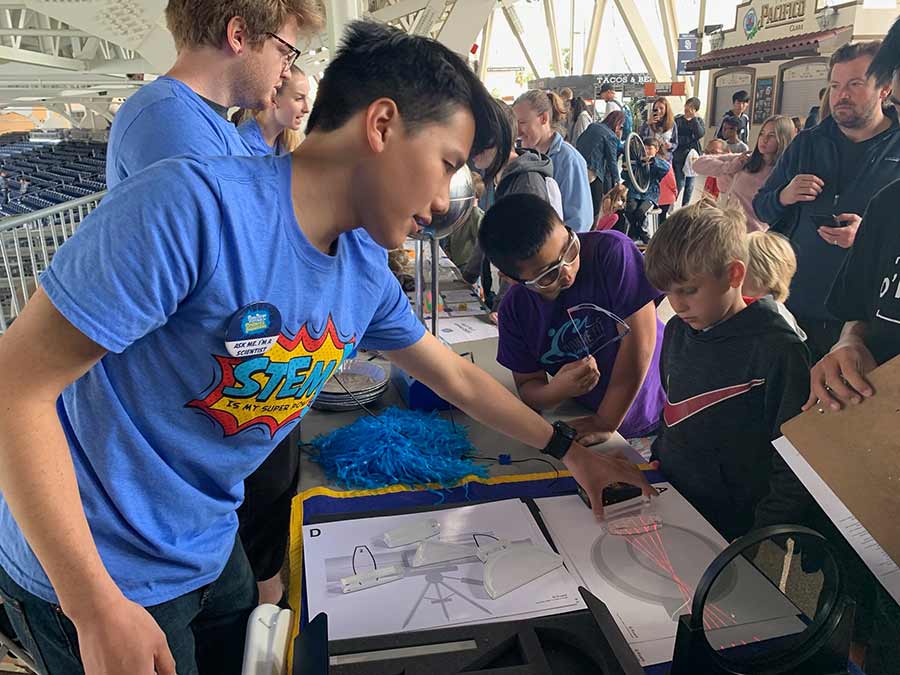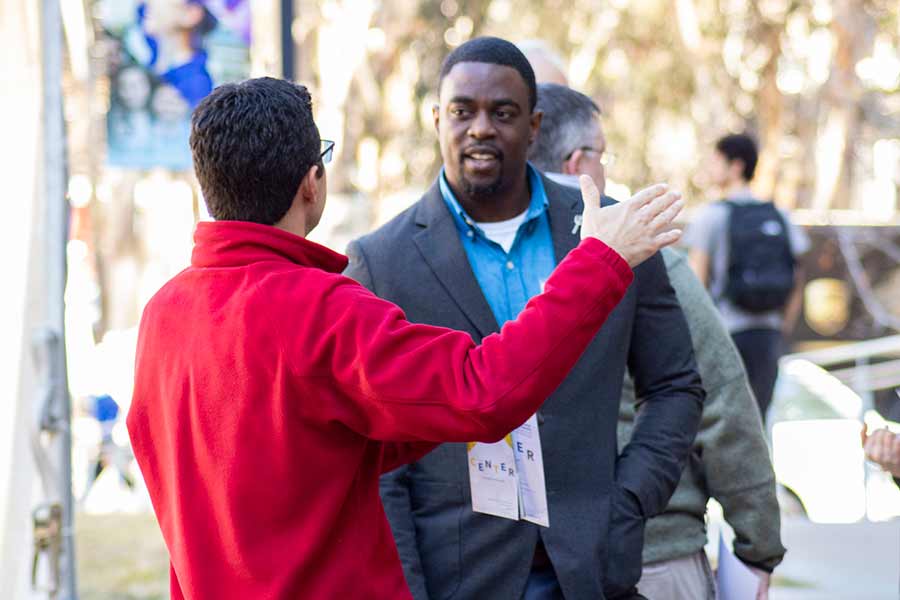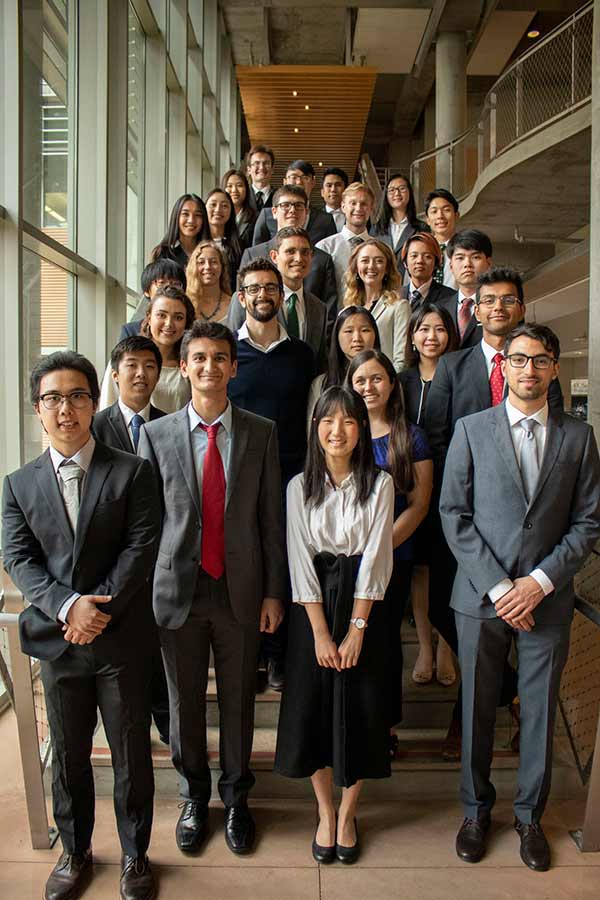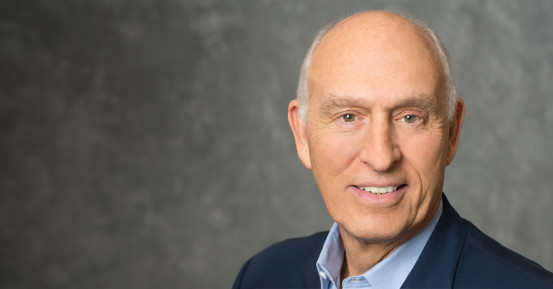By:
- Cynthia Dillon
Published Date
By:
- Cynthia Dillon
Share This:
A Chapter of Renewal
Student Success Center coalesces efforts to resurrect underrepresented STEM student group

UC San Diego Physical Sciences students at work (far left) during a community outreach event, pre-pandemic. Photo by Tatiana Diaz De Leon, UC San Diego Student Success Center.
Diversity, equity and inclusion (EDI) are objectives for many contemporary workplaces, including institutions of higher education. For UC San Diego’s Dean Steven Boggs, these goals drive key initiatives in the Division of Physical Sciences. For example, Boggs appointed an associate dean of EDI, Alison Coil, four years ago; he created a Task Force for Women in the Physical Sciences whose co-leader, Department of Chemistry and Biochemistry Chair Vicki Grassian, instituted a Vice Chair of EDI and Climate. Early in his term as dean, Boggs also distributed a student climate survey to help inform divisional initiatives, which included a center for student success.
“The Student Success Center offers a turning point for the division as we look for impactful ways, outside the classroom, to support all of our students’ academic and career success,” said Boggs.
The center, which opened in February 2020, offers physical sciences students mentoring and internship opportunities in preparation for their careers. It also develops programs and events to continuously deliver on this mission—even amid this pandemic. It also has helped the division climb higher toward its EDI goals by working to reestablish a campus chapter of the Society for Advancement of Chicanos/Hispanics and Native Americans in Science (SACNAS).
Resurrection in process
SACNAS is an inclusive organization dedicated to fostering the success of Chicanos/Hispanics and Native Americans, from college students to professionals, in attaining advanced degrees, careers and positions of leadership in STEM. For nearly 50 years, the nationwide organization has worked to support underrepresented communities in STEM, noting that America’s population demographics are changing. Its website states that by 2060, for example, Hispanics will comprise 29 percent of the country’s population.
Franklin Garrett is the director of programs and operations for the center. He also serves as an advisor for the SACNAS chapter on campus. “The Student Success Center provides fiscal and programmatic support to the student organizations in the Mathematics, Chemistry and Biochemistry, and Physics departments,” he said, “as well as STEM diversity student organizations, like SACNAS.”

UC San Diego SACNAS Chapter Advisor and The Student Success Center’s Director of Operations and Programs Franklin Garrett (center), at The Center’s opening event in February. Photo by Michelle Fredricks, UC San Diego Physical Sciences.
According to Garrett, physical sciences students themselves expressed interest in reestablishing the chapter, which had diminished over time through student attrition. There was also strong interest from staff and faculty, so the Student Success Center provided seed money for the renewed chapter and helps process reimbursements for student organization activities.
“In a somewhat organic fashion, a SACNAS planning committee was established, which was composed of members across campus, with the shared goal of establishing the chapter,” said Garrett. “The committee consists of myself, Edgar Beas from the Graduate Division; Sinai Cota, also from the Graduate Division; Olivia Molinar-Inglis for pharmacology and Beto Vasquez from CREATE.”
Garrett said that the advising committee identified student leaders who were interested in SACNAS and encouraged them to garner support from other students who were interested in joining the effort. All co-founding advisors—Beas, Cota, Garrett, Molinar-Inglis and Vasquez—helped student leaders apply for campus recognition as a chapter, which was achieved in March 2020.
“I am pleased with the cross-campus collaboration that has taken place in order to reestablish the chapter, and I am impressed by the positive impact that the student leaders have had in the short time since it came back to life on campus,” said Garrett.
The leaders at work
One of those leaders is graduate student Andres Nevarez, a Howard Hughes Medical Institute (HHMI) Gilliam Fellow and Ford Fellow with the Hao Lab in the Division of Biological Sciences.
“When I arrived at UC San Diego in the fall of 2018, I wanted to join the SACNAS chapter. I was disappointed to find out that the chapter had lost active status and was no longer available for new members,” said Nevarez. “So, I reached out to SACNAS national about starting a new chapter since I had experience founding chapters on two other campuses. SACNAS had played a large role in my undergraduate and graduate experience, and I wanted to bring SACNAS to UC San Diego students to offer a community for those like me in STEM.”
Nevarez said that he was referred to Vasquez at CREATE, who also had been in discussion with national about a new chapter at UC San Diego. They found that undergraduate and graduate students reacted positively to the chapter renewal.
“The principal members have said many times how SACNAS has enriched their experience at UC San Diego. From socials we have held, we have created a safe space for students to discuss issues, experiences and to ask questions, something these students did not have prior,” Nevarez said. “The UC San Diego STEM community has been very supportive, enthusiastic and involved in the success, sustainability and expansion of this chapter.”

Division of Physical Sciences Dean’s Undergraduate Excellence Award Winners, 2019. Photo by Michelle Fredricks, UC San Diego Physical Sciences.
The positive reception bodes well for students, including Latinx undergraduates and graduate students.
“Many Latinx students feel a lack of support and community within the campus,” said Molinar-Inglis, a UC President’s Postdoctoral Scholar and biomedical sciences researcher. “Many of my students are surprised at the small number of Latinx students, mentors, researchers, administrators and professors on campus. Therefore, I thought this was a great opportunity to re-start SACNAS to help build a strong community and support system for our students, where they can find a network of mentors, professional development and guidance throughout their college career.”
Molinar-Inglis noted that, while it seems that everyone is trying to promote awareness and programming on diversity issues on campus, it is still difficult to disseminate all the information. By reestablishing the SACNAS chapter, it can serve as the “middle man” to connect all the various organizations, activities and their missions she said.
“I started mentoring a former UC San Diego-SACNAS president about four or five years ago, and one of our discussion points was that SACNAS was almost non-existent at UC San Diego. There was a governing body, and some members wanted help to better establish themselves as a chapter, build a robust membership and provide opportunities in STEM for Latinx students at the university. I started by helping them initiate effective STEM high-school outreach events,” said Molinar-Inglis.
Through conversations to improve the SACNAS chapter on campus, Molinar-Inglis also learned, in process, that it was no longer recognized nationally by the SACNAS organization. “Therefore, I started pushing to try to reestablish the chapter. The interest was there, but the means and students wanting to drive the project were non-existent,” she said.
So the mentor in the Department of Pharmacology (TREJOlab) said she initially started to conspire with Vasquez on bringing SACNAS back to life at the university. Eventually, SACNAS national served as a conduit between her and Vasquez and Beas and Garrett, who were also inquiring about obtaining national status again. “That is how the amazing team was established,” Molinar-Inglis explained. “All the co-founding advisors bring different strengths to the table and our goal included to formulate a bullet-proof plan for the chapter to succeed over time and student turnover.”
An organization thriving
According to Molinar-Inglis, the next step was to identify students who were motivated both at the graduate level and undergraduate level to resurrect the chapter. “From its inception to its current status, the chapter has grown tremendously, and I am very excited at the programming I have started to see being driven within the UC San Diego community,” she said.
Beas noted that the Graduate Division has been a strong partner of the SACNAS organization for years. “We wanted to make sure that there was a campus chapter that was active, engaged and that had a strong foundation,” he said. “We proceeded to join forces with the different voices across campus that were advocating for a SACNAS chapter and that was how the first meeting happened.”
Visit the SACNAS Chapter at UC San Diego website to learn more about its resources and upcoming events. Meanwhile, the national chapter of SACNAS is hosting its National Diversity in STEM Virtual Conference, October 19 – 24, 2020. According to its website, the largest multidisciplinary and multicultural STEM diversity event in the country serves to equip, empower and energize participants for their academic and professional paths in STEM. Over the course of the conference, college-level through professional participants are immersed in cutting-edge STEM research, professional development sessions, motivational keynote speakers and the Graduate School & Career Expo Hall. The event will also include multicultural celebrations and traditions, and an inclusive and welcoming community of peers, mentors and role models. The SACNAS conference serves as a broadly inclusive space where attendees are encouraged and empowered to bring their whole selves to STEM.
SACNAS was founded on a principle that has actively sought to bring much needed change within the community of scientists worldwide. With this objective in mind, the UC San Diego chapter has committed itself to empowering all individuals, from all backgrounds, who are not only passionate about science, but who are also seeking to be ambassadors of change. The chapter’s primary goal is to provide the necessary resources to both an internal community at UC San Diego, and externally to the community in San Diego (K-12 schools and community colleges). The chapter welcomes all who stand in solidarity with its mission and looks forward to expanding its family of fellow SACNISTAS.
Share This:
You May Also Like
Stay in the Know
Keep up with all the latest from UC San Diego. Subscribe to the newsletter today.



